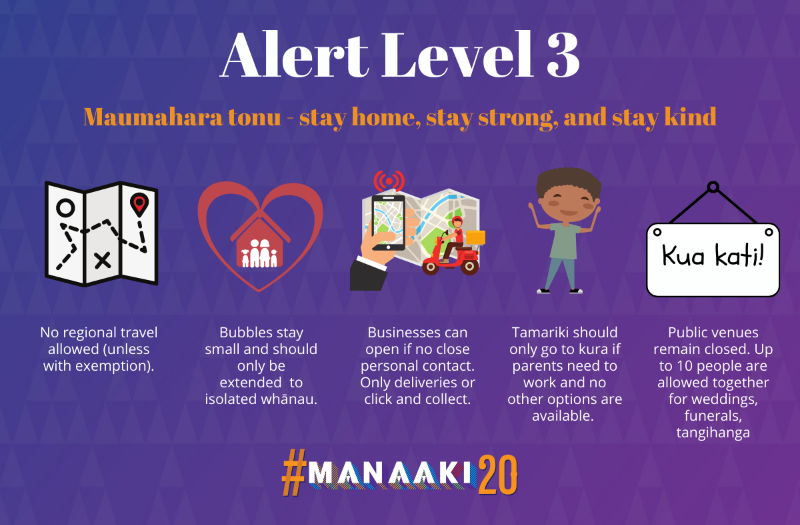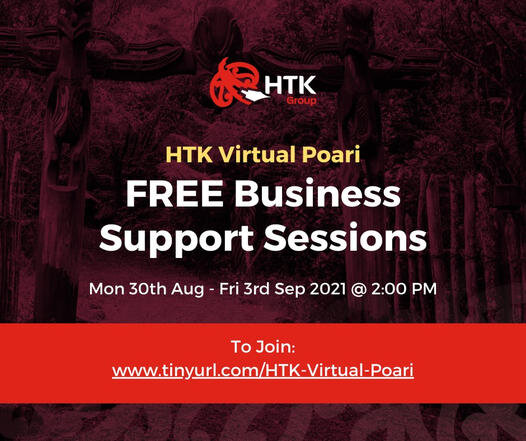As Te Waipounamu prepares for a shift to Alert Level 3 this evening, I know that you will join me in a moment of cautious appreciation. We must be grateful for the remarkable efforts of so many - Whānau Ora partners, whānau members, Navigators, vaccinators, health sector practitioners, kaimahi - over the past two weeks, and in particular send a huge mihi to the communities of Tāmaki Makaurau and Te Whānganui-a-Tara for their efforts at containing the outbreak.
We are especially grateful to have been shielded from this cluster given today's news that the hospitalisation rate is twice that of previous outbreaks, and that families from the Samoan community have been heavily hit and make up most of those numbers. Given that COVID-19 poses a comparable risk for Māori and Pasifika, we can extrapolate that we would be seeing a similarly high rate of hospitalisation if the virus had spread into our communities.
We also learned that six of the current cases are pēpi under the age of one. Added to the statistics telling us that two thirds of the cases are under 30 years old, this confirms what we already knew about the Delta variant's effect: younger, quicker, sicker.
Even as we move down to Alert Level 3 here in Te Waipounamu, the Whānau Ora community remains acutely aware that the wellbeing of our whānau is not defined by the presence, absence or prevention of COVID-19. Lockdown has had a cruel impact on our most vulnerable, bringing increased challenges around mental health, whether that's due to loneliness and isolation or stress caused by income insecurity - or the experience of holding tangihanga at this time and farewelling loved ones within such tight constraints. Te Pūtahitanga o Te Waipounamu will continue to advocate for increased levels of resources, and work to support the ongoing efforts across the Whānau Ora network. We have also included links to information about financial assistance and business support further down in this email.
Try out some of these tips to boost your hauora over the weekend, particularly if you've been feeling stressed or anxious during lockdown.
Key information
I know there is a great deal of information coming out every day, and it can be difficult to keep on top of it. We have condensed these key updates to the following, and we are also regularly updating our website:
There are 49 new cases of COVID-19 in the community, all in Auckland.
Of the 33 cases that have been hospitalised, eight are in ICU and two of these are on a ventilator.
There are now six cases under the age of one.
At 11:59pm tonight, all of Aotearoa south of Auckland will move to Alert Level 3.
Auckland will remain at Alert Level 4 for at least two more weeks, while all going well, Northland will move to Alert Level 3 at 11:59pm on Thursday.
Scanning or signing in remains mandatory at public venues and events, and masks must also be worn in public.
The list of locations of interest list continues to shrink. This is because historical locations are being removed and the effect of lockdown can be seen as there are fewer new locations added. However, it is still important that whānau check these new locations.
Anyone who visited these locations at the stated date and time must self-isolate, contact Healthline on 0800 358 5453 and get tested.
Household members of people who were at locations of interest must also self-isolate until that person has returned a negative test.
Testing stations remain open and demand has eased. It is important that you get tested if you are experiencing symptoms of COVID-19 or if you visited a location of interest at the stated date and time. Visit Health Point to find testing centres near you.
Māori and Pasifika whānau can be vaccinated together when one member of the family is eligible. Call 0800 28 29 26 to make a booking.
Parents and guardians who are eligible can book their 12-15 year old children to be vaccinated with them.
Emergency Puna funding
Over the past two weeks since lockdown began, we have seen a record number of applications to our Puna fund - a total of 4,877 applications relating to 21,046 individual whānau members. By comparison, we received 4,202 applications relating to 18,204 individual whānau members over the course of last year's four-week lockdown.
Our incredible data team has been preparing daily reports on these applications through this lockdown period, and we have been sending these to relevant ministers and government agencies to provide an insight into the very real hardship that our communities are currently facing. We hope that these reports will translate into increased support for the Whānau Ora network and will keep you updated on our efforts in this space.
We are also concerned by recent reports that supermarkets have been increasing their prices during this lockdown period, and encourage you to email us if you have noticed this happening at your local supermarket.
In the meantime, we still encourage whānau to apply for emergency funding - we can provide support in the form of supermarket vouchers and payments towards their power and data bills.
Vaccinations
Vaccination remains the best way to protect our communities against the inevitability of future outbreaks, and Māori health providers are pushing for accelerated vaccination in their communities. While Te Pūtahitanga o Te Waipounamu supports the rangatiratanga of whānau to make their own decisions about the vaccine - whatever that may be - we are equally committed to ensuring whānau have access to the right resources and people to make sure that decision is fully informed. It would be a very great tragedy if Māori communities that are already underserved are failed yet again because the health system doesn't know how to connect with them.
In the coming weeks we will be sharing the stories of whānau champions who have overcome their own uncertainties where the vaccination is concerned, as well as providing opportunities for whānau to connect with Māori health professionals who can answer their pātai.
This kōrero with Dr Kiriana Bird is a good place to start for whānau who want to learn more about the COVID-19 vaccine.
We encourage those whānau who are ready to be vaccinated to book an appointment now. You can do this by visiting Book My Vaccine or by checking out one of the amazing community clinics being stood up throughout the motu. This includes a new clinic in Ōtautahi at South City, run by the Māori and Indigenous Health Institute (MIHI). You can book for this clinic below.
Our Te Pūtahitanga o Te Waipounamu kaimahi Mihi-Rose, Sam and Sharon waiting for their COVID-19 vaccinations.
Youth Community Mental Wellbeing Fund
The Ministry of Health has launched a $1 million fund for grassroots initiatives that are supporting the mental wellbeing of youth through the impacts of COVID-10. The Youth Community Mental Wellbeing Fund will provide grants of up to $100,000, recognising that the impacts of lockdown can be greater for rangatahi due to their life stage and the fact that housing and employment is typically more transient. Some ideas of things that may be funded by the campaign include:
Social media campaigns
Virtual support – including practical support for organisation to move virtual (e.g. Zoom licences or data plans)
Virtual support – peer to peer, group forums, training for peer support
Initiatives that alleviate distress for youth (this could be a practical focus such as period poverty initiatives)
Outreach, self-help, practical advice to manage distress (e.g. navigation to services)
Applications are open now until 6 September, with funds expected to be in place for successful applications before the end of September.
Rent arrears
If you have overdue rent and you're worried you will lose your housing, you can talk to Work and Income for support.
You don't need to be on a benefit to qualify for this help.
It's a one-off payment.
You'll need to pay the money back. We'll put a repayment plan in place to suit your financial circumstances.
You may be able to get Rent Arrears Assistance if you:
are 16 or older
have signed the tenancy agreement (or you're a tenant by way of a Family Violence Act order)
have overdue rent you need to pay
may be evicted because you haven't paid your rent
are able to stay there if you pay the rent you owe, eg:
your tenancy isn't about to expire
you can afford to keep paying the rent.
Apply by contacting Work and Income on one of the numbers below. If you're:
getting NZ Super or Veteran's Pension, call Senior Services on 0800 552 002
a student, call StudyLink on 0800 88 99 00
getting another payment from WINZ, call 0800 559 009
not getting any payments from WINZ, call 0800 559 009.
Business support sessions
By popular demand, our friends at HTK Group are continuing their free business support workshops this week. These take place at 2pm every day and will feature guest speakers including Tuari Dawson, TJ Mauheni, Sir Buck Shelford and the Minister for Small Business, Hon Stuart Nash. Join by following this link at 2pm any day this week.
Alert Level 3
While a shift to Alert Level 3 marks fantastic progress in our efforts to stamp COVID-19 out, we remind everyone that it is still very much lockdown - or "Alert Level 4 with takeaways". Although some workers will be able to return to mahi, and some tamariki to school, many of us will continue working and learning from home, or simply being unable to work at all. Visit the Unite Against COVID-19 website for a full list but the basic rules are:
Wear a face covering in public
Scan and sign in wherever you go
Bubbles shouldn't change unless they need to expand slightly to support an isolated or unwell whānau member.
Stay local. Whānau should continue to shop and exercise locally.
More businesses can open. Restaurants and retail can open for contactless pick up. Businesses that require close physical contact like hairdressers will remain closed.
Home school if you can. Tamariki should keep learning from home unless they do not have supervision at home.
Weddings, funerals, and tangihanga can be held with a limit of 10 people and no food or drink can be served




